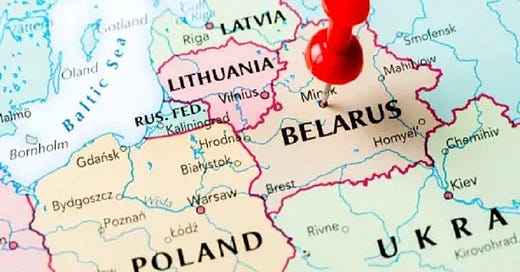The very fact that the Belarusian leader said that NATO and/or Ukraine’s dispatch of “small units” to his country wouldn’t cross his red line suggests that he expects that it might occur in the near future. As long as this isn’t “full-blown aggression” that sees their “troops…cross the border and start a (larger) war”, then he wouldn’t request the use of Russia’s tactical nukes in response to Belgorod-like scenarios.
Belarusian President Alexander Lukashenko shared his country’s red line in a video interview that was released on Wednesday. According to him, “red lines are a full-blown aggression from any side now, except Russia, of course. The Baltic countries, Poland and Ukraine. If they send troops, not small units, to cross the border and start a war, that is aggression.” He also said that he “won’t hesitate” to use tactical nukes and that it would only take a single call with Russia to coordinate this in that event.
Belarus’ red line is reasonable since employing these weapons in response to Belgorod-like proxy incursions would be an overreaction, especially since Russia hasn’t resorted to those means in this exact same scenario, hence why it’s unrealistic to expect it to approve Minsk’s use of them if that happens. Nevertheless, the very fact that Lukashenko said that NATO and/or Ukraine’s dispatch of “small units” to his country wouldn’t cross his red line suggests that he expects that it might occur in the near future.
He already warned at the beginning of the month during the latest CIS security chiefs’ summit in Minsk that the West is plotting a much more violent coup attempt against him than the one that they failed to pull off in summer 2020. Director of the FSB Alexander Bortnikov also accused the West of being responsible for the recent wave of sabotage in their countries during this meeting. Taken together with Lukashenko’s latest words, it’s probable that Belgorod-like proxy incursions might soon target Belarus.
If they’re launched from NATO’s Latvian, Lithuanian, and/or Polish members, then Belarus’ hands would be tied in terms of its conventional response since it couldn’t attack their bases in that bloc without risking the possibility of them retaliating and possibly requesting American support via Article 5. Should that sequence of events unfold, then it’s unclear whether potentially large-scale air and/or artillery strikes from NATO would cross Lukashenko’s red line or if only the dispatch of formal “troops” would.
It might not be his decision to make in that case though considering Belarus’ status as Russia’s mutual defense ally and the importance that it plays in the latter’s national security strategy. The Kremlin would almost certainly not leave such aggression against its fellow Union State member unanswered, which would therefore risk the nuclear escalation that both sides in the NATO-Russian proxy war need to avoid. With this in mind, NATO might thus prefer to launch proxy incursions against Belarus from Ukraine.
As long as this isn’t “full-blown aggression” that sees NATO and/or Ukrainian “troops…cross the border and start a (larger) war”, then it wouldn’t entail the risks that doing this from Latvia, Lithuania, and/or Poland would. The Union State could target these terrorists inside Ukraine while their opponents could try stirring up as much trouble as they’d like without either fearing a nuclear war by miscalculation as a result of their respective actions.
These parameters are sensible enough for both sides, which is why the Belgorod-like proxy incursions against Belarus that Lukashenko just strongly hinted that he expects will probably come from Ukraine and not any of his country’s three NATO neighbors. Kiev could orchestrate these provocations in the very near future too as a means of distracting from the failure of its NATO-backed counteroffensive over the past week, which could even potentially be timed to take place during next month’s NATO Summit.
Doing this then could be spun to the Western public as supposedly proving that their side has the edge even if the counteroffensive still fails to meet any of their expectations by then. Accordingly, it would only be for the sake of optics if Belgorod-like proxy incursions were launched against Belarus around that time since they wouldn’t change the conflict’s military-strategic dynamics, but managing the public’s perceptions about remains an important task of their leaders and that’s why this might happen then.





"...he wouldn’t request the use of Russia’s tactical nukes in response to Belgorod-like scenarios."
What, you mean, like an adult (wouldn't ask)?
"...Russia hasn’t resorted to those means..."
What, you mean, like an adult?
(Покажи мне, кто твой друг...)